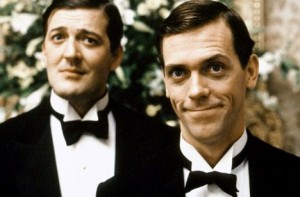I love music analysis. I love understanding how music works: what harmony is being employed, how the tonal scheme is operating across a piece, how a particular effect is created tonally or texturally, or what structural principles are being used.
I am aware, also, though, that analysis isn’t everything: sometimes, an emotional response can’t be reasoned in terms of tonality, of harmony, or of form. Ultimately, perhaps, defining one’s enjoyment of a piece is a question of balance, of perspective: perhaps a true appreciation of music involves some elements of both an analytical understanding as well as a pure visceral reaction.
 And when it comes to perspective, P. G. Wodehouse’s marvellous comic creations, Jeeves and Wooster, are the yin and yang: Bertie’s pure enjoyment (unhindered by anything remotely akin to an intellectual understanding – one of his charms), and Jeeves’ clinical knowledge which admits of no emotional response at all (one of his).
And when it comes to perspective, P. G. Wodehouse’s marvellous comic creations, Jeeves and Wooster, are the yin and yang: Bertie’s pure enjoyment (unhindered by anything remotely akin to an intellectual understanding – one of his charms), and Jeeves’ clinical knowledge which admits of no emotional response at all (one of his).
Their exchange about ‘Minnie the Moocher’ epitomises these attitudes, which you can see here.
Priceless.
I suspect there’s a Jeeves and Wooster moment for everything in life…

